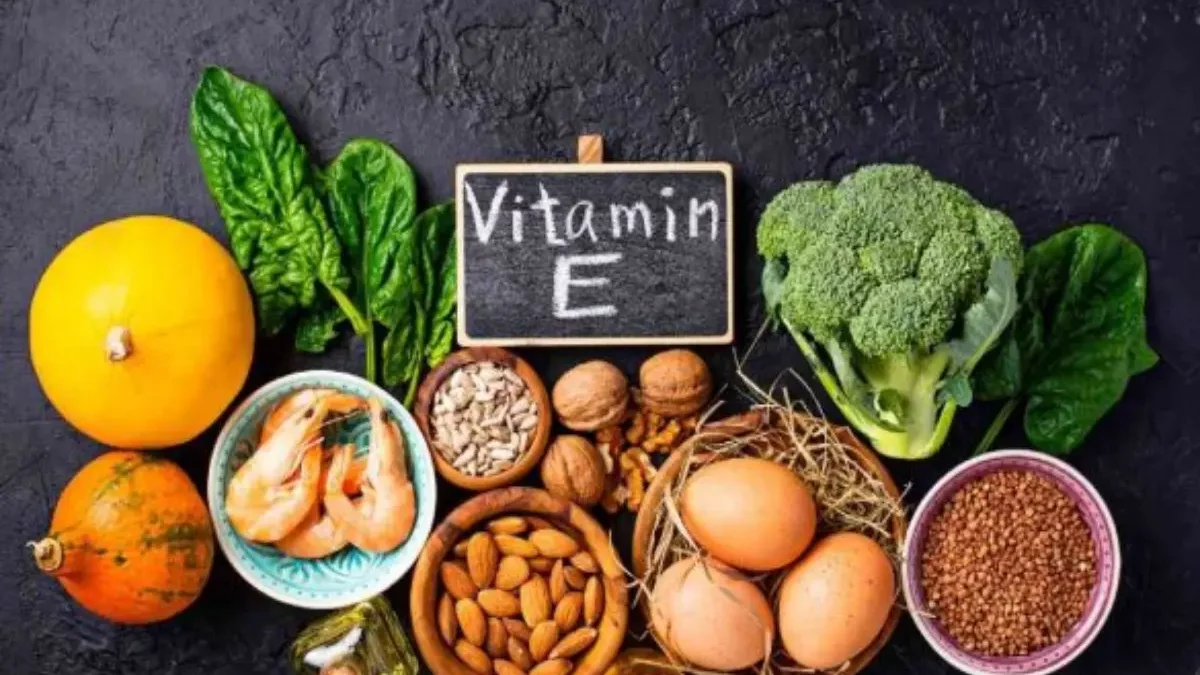wellhealthorganic.com:vitamin-e-health-benefits-and-nutritional-sources – When it comes to wellness, nutrients like vitamin C and vitamin D often take center stage, and for a good reason, too.
Meanwhile, Among other important health benefits, these vitamins are essential for immune function and are a hot topic in the world of wellness.
But, what about other important nutrients, like vitamin E?
It may not get as much notice as other vitamins, but this antioxidant-rich vitamin.
Moreover, found in everything from face creams to drugstore shampoos—is just as important to your health.
Here’s what you want to know about the health benefits of vitamin E, plus which vitamin E-rich foods to eat for healthier skin, hair, immunity, and health.
Table of Contents
What is Vitamin E? wellhealthorganic.com:vitamin-e-health-benefits-and-nutritional-sources
Vitamin E is a important nutrient that plays a vital role in maintaining overall health and well-being.
I addition, it is a fat-soluble vitamin with powerful antioxidant properties, protecting our cells from damage caused by harmful free radicals. This article explores the various health benefits associated with vitamin E and highlights its rich sources in our diet.
Body: wellhealthorganic.com:vitamin-e-health-benefits-and-nutritional-sources
Antioxidant Protection

Vitamin E’s primary role lies in its potent antioxidant activity. It helps neutralize free radicals, which are unstable molecules that can damage cells and contribute to chronic diseases such as heart disease and cancer.
By scavenging these free radicals, vitamin E safeguards our cells from oxidative stress and reduces the risk of cellular damage.
Heart Health wellhealthorganic.com:vitamin-e-health-benefits-and-nutritional-sources
Several studies have look a positive relationship between vitamin E intake and heart health. It helps prevent the oxidation of low-density lipoprotein (LDL) cholesterol, often referred to as “bad” cholesterol, thereby reducing the risk of atherosclerosis and cardiovascular diseases. Additionally, vitamin E may enhance blood circulation, improve arterial function, and reduce inflammation, further promoting cardiovascular well-being. As per the article of wellhealthorganic.com:vitamin-e-health-benefits-and-nutritional-sources
Immune System Support

Vitamin E plays a crucial role in maintaining a robust immune system. It aids in the production of immune cells and enhances their effectiveness in combating infections. wellhealthorganic.com:vitamin-e-health-benefits-and-nutritional-sources. Vitamin E’s antioxidant properties also help protect immune cells from damage caused by free radicals, ensuring their optimal functioning. Adequate vitamin E intake is essential for strengthening the body’s defense mechanisms and reducing the risk of infections and illnesses.
Skin Health and Aging
In the article wellhealthorganic.com:vitamin-e-health-benefits-and-nutritional-sources, Vitamin E is widely recognized for its skin-nourishing benefits.
Its antioxidant properties help to protect the skin from oxidative damage caused by exposure to ultraviolet (UV) rays and environmental pollutants.
Vitamin E also supports the skin’s natural moisture barrier, promoting hydration and reducing dryness. Furthermore, it may aid in the healing process of wounds and minimize the appearance of scars.
Regular consumption of vitamin E-rich foods or the application of vitamin E topically can contribute to healthier, youthful-looking skin.
Benefits of wellhealthorganic.com:vitamin-e-health-benefits-and-nutritional-sources
wellhealthorganic.com:vitamin-e-health-benefits-and-nutritional-sources Here are the benefits list of Vitamin E:
Vitamin E is a powerful antioxidant that offers numerous health benefits. Here are some of the key advantages associated with this essential nutrient:
- Antioxidant Protection: Vitamin E’s primary role is its antioxidant activity, which helps neutralize harmful free radicals in the body. Therefore, by doing so, it protects cells from oxidative damage and reduces the risk of chronic diseases like heart disease, cancer, and age-related macular degeneration.
- Heart Health: Vitamin E supports cardiovascular health by preventing the oxidation of LDL cholesterol, which helps reduce the buildup of plaque in arteries. This reduces the risk of atherosclerosis and lowers the chances of heart attacks and strokes.
- Immune System Support: Vitamin E plays a vital role in enhancing immune function. It helps stimulate the production of immune cells and improves their effectiveness in fighting off infections and diseases. Adequate vitamin E intake strengthens the body’s defense mechanisms and promotes overall immune system health.
- Skin Health and Aging: Vitamin E is known for its skin-nourishing properties. It protects the skin from oxidative damage caused by UV radiation and environmental pollutants, helping to maintain a youthful appearance. Additionally, it aids in moisturizing the skin, promoting healing, and reducing the visibility of scars and wrinkles.
- Eye Health: Vitamin E may play a role in maintaining eye health and preventing age-related eye conditions. It protects the cells in the eyes from oxidative stress, reducing the risk of cataracts and age-related macular degeneration.
- Cognitive Function: Some studies advice that vitamin E has positive effect on cognitive function and reduce the risk of cognitive decline. It helps protect brain cells from oxidative damage, which is important for maintaining brain health as we age.
- Anti-inflammatory Effects: Vitamin E possesses anti-inflammatory properties, which can help reduce inflammation in the body. Chronic inflammation is associated with various diseases, including heart disease, diabetes, and certain types of cancer. By reducing inflammation, vitamin E may contribute to overall health and well-being.
Nutritional Sources
Firstly, Vitamin E can be obtained from various dietary sources. The most common sources include:
- Nuts and seeds: Almonds, sunflower seeds, hazelnuts, and peanuts are excellent sources of vitamin E.
- Vegetable oils: Wheat germ oil, sunflower oil, and safflower oil contain high levels of vitamin E.
- Leafy greens: Spinach, Swiss chard, and kale exist nutrient-dense greens that provide vitamin E.
- Avocado: This fruit not only provides healthy fats but also contains vitamin E.
- Fortified foods: Some cereals, bread, and other processed foods are fortified with vitamin E.
Conclusion
wellhealthorganic.com:vitamin-e-health-benefits-and-nutritional-sources vitamin E is an essential nutrient with numerous health benefits.
Therefore, Its antioxidant properties help protect cells from damage, supporting heart health, immune function, and skin vitality.
Moreover, Incorporating vitamin E-rich foods into your diet is a natural and effective way to ensure an adequate intake.
Remember to maintain a balanced diet that includes a variety of sources, such as nuts, seeds, vegetable oils, leafy greens, and fortified foods. By doing so, you can harness the power of vitamin E and optimize your overall health and well-being.


